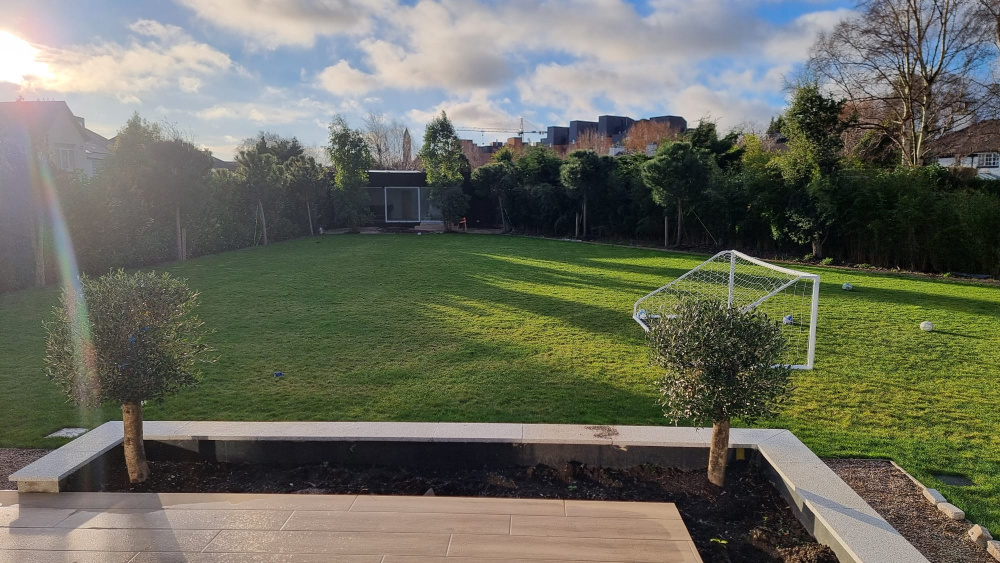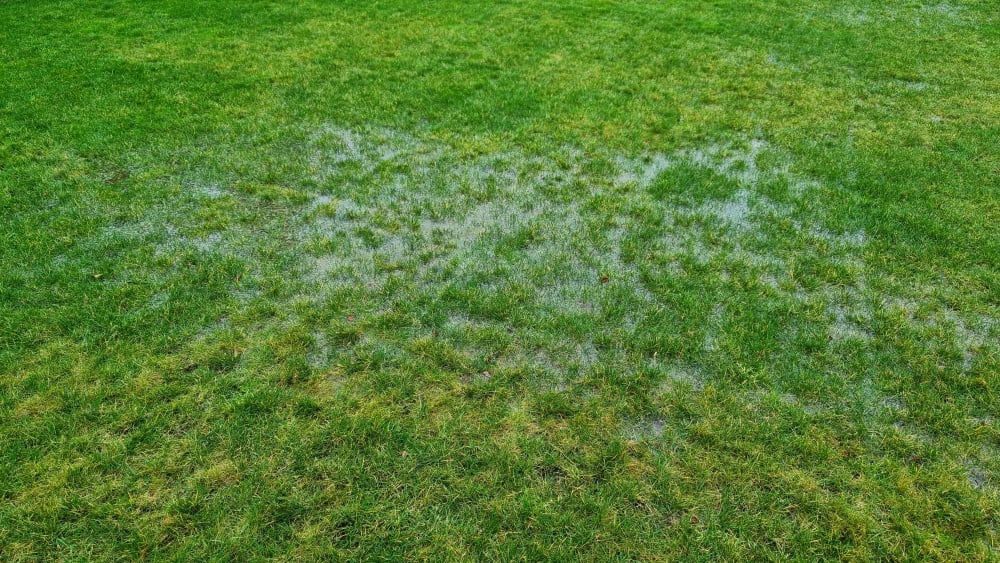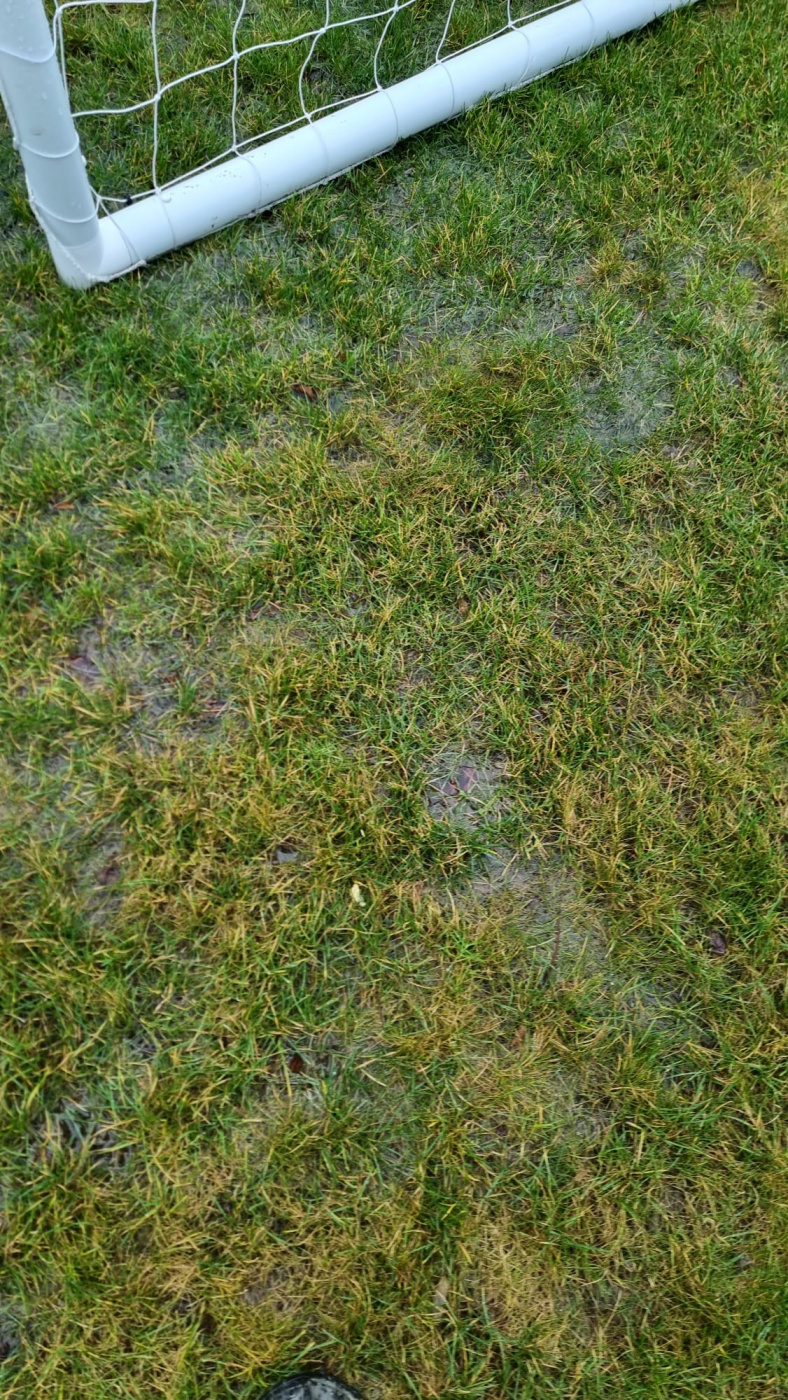This Forum will close on Wednesday 27 March, 2024. Please refer to the announcement on the Discussions page for further detail.
(Expensive) New Turf Lawn is Constantly Waterlogged. Please Advise on Drainage Solutions?
Hello there,
We knocked down an old house and build a new one last year. As part of this we put in a large (about 950m2) new lawn using lawn turf about last August/September.

Unfortunately the new lawn is not working out at all. We're located close to the sea (about 350m as the crow flies) and our site is certainly prone to being wet, if you dig down about 4-5 feet you get to very sandy soil and water and we had to put the house on piles. In saying that the house that was here before had a nice garden and the lawn looked good in winter and never became waterlogged even after heavy rain.
The problem main problem with the new lawn is it's constantly wet. To walk around on it it's nearly constantly squelshy underfoot. If we get rain for any length of time pools of water appear.


The areas where water is pooling have turned yellow and do not look healthy. But the main issue was the lawn was mainly for my football mad young sons and we've spent pretty much the whole time since the lawn has gone in not letting them go on it as it is too wet underfoot and we don't want them destroying it. The lawn is also (you can't see it from the pictures) incredibly wavy and uneven. It started off reasonably flat (but not great) but its become really wavy in just a few months and I'd imagine it will get worse.
I'm not happy as this lawn was incredibly expensive to put in and I don't think the guys doing it did a great job. I suspect the ground got quite compacted during the build and they did not do much to loosen it up. They basically added a bunch of screened topsoil and sand (which I see mixed opinions on whether this should be used) on top of what was there and plonked the grass on top. They are trying to argue that it's not their fault that the lawn is not doing well.
What I'm looking for is suggestions on what can be done to improve drainage and try to make the lawn more usable?
I'm guessing some sort of drain put in under the lawn leading to storm drain pipes might be the best in that the water would be drained away. Not sure if this could be done simply.
The other option might be somthing like here: https://www.youtube.com/watch?v=5R8StYZQi_8 Basically drilling a bunch of holes with an auger and filling with pebbles. Not sure if this would work and as I say it is very wet when you go down deeper so this may not work. But it would be a simpler solution.
Anyway, any advice would be much appreciated. I have had poor luck with gardeners so I don't have anyone competent to advise me on this. This site seems to be filled with knowledgeable people so I'm hoping someone can point me in the right direction and then I can find someone to do the work.
Thanks in advance!
We knocked down an old house and build a new one last year. As part of this we put in a large (about 950m2) new lawn using lawn turf about last August/September.

Unfortunately the new lawn is not working out at all. We're located close to the sea (about 350m as the crow flies) and our site is certainly prone to being wet, if you dig down about 4-5 feet you get to very sandy soil and water and we had to put the house on piles. In saying that the house that was here before had a nice garden and the lawn looked good in winter and never became waterlogged even after heavy rain.
The problem main problem with the new lawn is it's constantly wet. To walk around on it it's nearly constantly squelshy underfoot. If we get rain for any length of time pools of water appear.


The areas where water is pooling have turned yellow and do not look healthy. But the main issue was the lawn was mainly for my football mad young sons and we've spent pretty much the whole time since the lawn has gone in not letting them go on it as it is too wet underfoot and we don't want them destroying it. The lawn is also (you can't see it from the pictures) incredibly wavy and uneven. It started off reasonably flat (but not great) but its become really wavy in just a few months and I'd imagine it will get worse.
I'm not happy as this lawn was incredibly expensive to put in and I don't think the guys doing it did a great job. I suspect the ground got quite compacted during the build and they did not do much to loosen it up. They basically added a bunch of screened topsoil and sand (which I see mixed opinions on whether this should be used) on top of what was there and plonked the grass on top. They are trying to argue that it's not their fault that the lawn is not doing well.
What I'm looking for is suggestions on what can be done to improve drainage and try to make the lawn more usable?
I'm guessing some sort of drain put in under the lawn leading to storm drain pipes might be the best in that the water would be drained away. Not sure if this could be done simply.
The other option might be somthing like here: https://www.youtube.com/watch?v=5R8StYZQi_8 Basically drilling a bunch of holes with an auger and filling with pebbles. Not sure if this would work and as I say it is very wet when you go down deeper so this may not work. But it would be a simpler solution.
Anyway, any advice would be much appreciated. I have had poor luck with gardeners so I don't have anyone competent to advise me on this. This site seems to be filled with knowledgeable people so I'm hoping someone can point me in the right direction and then I can find someone to do the work.
Thanks in advance!
0
Posts
Here’s one posted by @glasgowdan, a lawn expert, but as he has not been active on the forum for three years this prompt is unlikely to reach him.
https://forum.gardenersworld.com/discussion/994144/drainage-in-a-pan-flat-clay-lawn#latest
I was also thinking where does the water from the house go, is the soak away under the lawn?
Thanks for the reply.
I'm not really sure of the depth of soil, at a guess maybe about 10cm. Here's some pics of it going in but they had already spread soil around previously. I suspect they did nothing to break up the compacted soil underneath.
Regarding the rainwater, there is a large (circa 10,000 litres) rainwater harvesting tank close to the house and then from that a drain running to the end of the garden (behind that wooden building) where all the drains run to.
So in theory there probably is somewhere to drain the water to close to the lawn but I suspect you could not run the lawn drainage into the harvester as it would be dirty
We were going to have to put in a very large rainwater attenuation tank as well as the rainwater harvesting as part of the planning process but our engineer said it would be pointless in that if you dig down the ground is often full of water (especially when the tide comes in at the sea close by) so it would not have worked. We got permission not to have it.
Trying to get the lawn more level/even is another project if we can ever sort out the drainage issues!
Digging a few trial holes to see what is down there would be a good idea. There is probably a specialised auger that would do the job.
If a high sea level causes this sort of flooding, be prepared for worse.
"Have nothing in your garden that you don't know to be useful, or believe to be beautiful."
The house is up on piles and about 1m up in the air so we're hopefully fairly flood proof for the future!